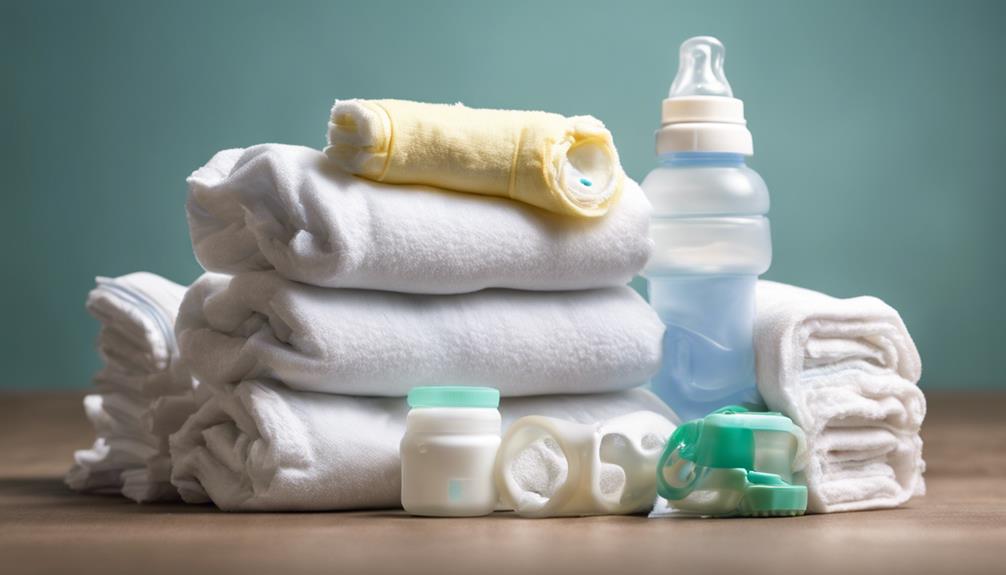As we commence our quest for Newborn Care Certification, it’s intriguing to observe that the need for certified Newborn Care Specialists has increased by 35% over the last five years.
Starting from understanding the requirements to finally obtaining the certification, each step plays a vital role in shaping your career in newborn care.
Through this step-by-step guide, we will uncover the essential strategies and resources needed to navigate this process successfully, ensuring that you are well-equipped to excel in this rewarding field.
Key Takeaways
- Select accredited training programs endorsed by industry organizations.
- Prepare thoroughly for written exams and practical assessments.
- Maintain certification with CPR training and continuing education credits.
- Demonstrate proficiency in newborn care techniques and safety protocols.
Understanding Newborn Care Certification Requirements
Understanding the requirements for newborn care certification is vital for individuals pursuing a career in this specialized field. Aspiring newborn care specialists must undergo specific training programs focusing on infant care. These programs often entail passing written exams, practical skills assessments, and obtaining CPR certification.
Additionally, background checks are typically mandatory to guarantee the safety and security of the infants under their care. To maintain certification, continuing education credits are necessary. This allows professionals to stay updated on the latest practices and techniques in newborn care.
Researching Accredited Training Programs

When initiating the journey to become certified in newborn care, it's essential to diligently research accredited training programs recognized by industry organizations for quality assurance. Look for programs like Newborn Care Specialist Training endorsed by the Newborn Care Specialist Association (NCSA) to guarantee credibility. Make sure the program covers essential topics such as newborn care techniques, feeding, sleep training, safety protocols, and business aspects.
Research the instructors' qualifications, experience, and teaching methods to guarantee a thorough learning experience that meets your educational needs. Check for certification opportunities upon completion of the training to enhance your credibility and job prospects in the newborn care field. Consider the program's flexibility, support resources, and networking opportunities to ensure a well-rounded certification experience that prepares you for success as a newborn care specialist.
Make informed decisions by exploring various accredited training programs that align with your career goals and learning preferences.
Enrolling in a Newborn Care Certification Course
Enrolling in a newborn care certification course involves registering online through the course provider's website, typically requiring payment of a fee that can vary based on the program and level of certification sought. When enrolling, consider these aspects:
- Flexible Scheduling: Some courses offer the flexibility to learn at your own pace, fitting your studies around your busy life.
- Access to Resources: Upon enrollment, gain access to a wealth of course materials, lectures, assignments, and valuable resources to kickstart your certification journey.
- Enhanced Skills: Enrolling in a reputable provider's program can boost your skills, knowledge, and credentials as a newborn care specialist.
- Payment Options: Be prepared to pay a fee for enrollment, which may differ depending on the level of certification you aim to achieve.
Choosing the right training program and enrolling with a reputable provider sets the foundation for your success as a newborn care specialist.
Studying for the Certification Exam

From enrolling in a newborn care certification course, the next step involves preparing diligently for the certification exam, which assesses candidates on a range of essential newborn care skills and knowledge. Studying for the exam entails reviewing course materials, practicing hands-on skills, and getting ready for scenario-based questions. It is essential to be well-versed in newborn care techniques, sleep training methods, breastfeeding support, and safety protocols to succeed in the certification process. Demonstrating proficiency through a written exam and practical skills assessment is key to becoming a Certified Newborn Care Specialist (NCS).
To help you organize your study plan effectively, here is a breakdown of the topics you should focus on:
| Topics | Description |
|---|---|
| Newborn Care Techniques | Learn essential skills for newborn care |
| Sleep Training Methods | Understand different approaches to sleep training |
| Breastfeeding Support | Know how to provide effective breastfeeding assistance |
| Safety Protocols | Familiarize yourself with safety guidelines for newborns |
Successfully Obtaining Newborn Care Certification
Obtaining newborn care certification is a crucial step towards advancing our career and enhancing our expertise in providing specialized care for infants. This process involves a combination of rigorous training and practical assessments to make sure we're well-prepared to offer the best care possible for newborns.
To successfully obtain newborn care certification, we need to focus on the following key steps:
- Passing the written exam: Demonstrating our theoretical knowledge in newborn care practices.
- Demonstrating practical skills: Showing proficiency in essential tasks such as diaper changing, feeding, and soothing techniques.
- Obtaining CPR certification: Being equipped to handle emergencies and make sure the safety of the infants in our care.
- Earning continuing education credits: Keeping our knowledge up-to-date with the latest advancements in newborn care practices.
Frequently Asked Questions
What Are the 5 Initial Steps of Newborn Care?
We check the baby's temperature, pulse, and breathing first. Then, we assess skin color, muscle tone, and reflexes. Cord care, feeding, and diapering routines are established next. Regular monitoring of weight gain and hydration is essential. Finally, we educate parents on newborn care basics.
What Are the Steps of Essential Newborn Care?
In essential newborn care, we prioritize immediate drying, skin-to-skin contact, and delayed cord clamping. Keeping babies warm, initiating breastfeeding, and conducting assessments are crucial. Administering injections, monitoring signs, and educating parents guarantee healthy beginnings.
What Are the Initial Steps of Nrp?
We assess the newborn, clear the airway, stimulate, and monitor breathing and heart rate to initiate Neonatal Resuscitation Program (NRP). These steps are essential for stabilizing the baby and providing timely interventions.
What Are the Levels of Newborn Care?
We take care of newborns at different levels. Level 1 involves parental guidance; Level 2: trained professionals like doulas; Level 3: medical staff in NICUs; Level 4: specialized care for complex conditions. Each level provides unique support for newborns and families.
Conclusion
To sum up, starting on the journey to achieve newborn care certification is like nurturing a delicate seedling into a flourishing plant.
With dedication, hard work, and the right resources, we can blossom into skilled and compassionate Newborn Care Specialists ready to make a difference in the lives of families and their precious little ones.
Let's embrace this opportunity to grow, learn, and thrive in this rewarding field of newborn care.









